Parasitism
Parasitism is a type of symbiotic relationship between two organisms, where one organism, called the parasite, benefits at the expense of the other organism, called the host. The parasite relies on the host for nourishment and shelter, often causing harm to the host in the process.
Characteristics of Parasitism:
- Dependence: The parasite depends on the host for survival and reproduction.
- Harm to the Host: The parasite often causes harm or disease to the host organism.
- Adaptations: Parasites have specialized adaptations to attach to the host and obtain nutrients.
- Specificity: Parasites are often species-specific, meaning they target a particular host species.
Examples of Parasitism:
There are numerous examples of parasitism in the natural world, including:
- The relationship between ticks and mammals, where ticks feed on the blood of the host.
- Parasitic plants, such as mistletoe, which grow on the branches of other trees and obtain nutrients from the host plant.
- Internal parasites, like tapeworms, that live inside the host's body and absorb nutrients from the host's digestive system.
Effects of Parasitism:
Parasitism can have various effects on the host, including:
- Reduced fitness and reproductive success of the host.
- Transmission of diseases and potential mortality in severe cases.
- Changes in behavior or physiology of the host due to the presence of the parasite.
Study Guide:
To understand parasitism better, consider the following study guide:
- Define parasitism and explain the roles of the parasite and the host in this relationship.
- Identify and describe at least three examples of parasitism in nature, including the specific adaptations of the parasites and the effects on the host.
- Compare and contrast parasitism with other symbiotic relationships, such as mutualism and commensalism.
- Discuss the ecological importance of parasitism and its potential impact on ecosystems.
- Examine the ways in which humans have been affected by parasitic infections throughout history and in modern times.
Understanding parasitism is essential in comprehending the complex interactions between organisms in nature and the impact of these relationships on ecosystems and human health.
.◂Science Worksheets and Study Guides Fifth Grade. Plant Responses and Adaptations
Study Guide Plant Responses and Adaptations
Plant Responses and Adaptations  Activity Lesson
Activity Lesson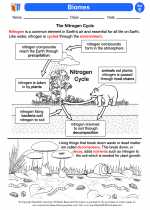 Biomes
Biomes  Worksheet/Answer key
Worksheet/Answer key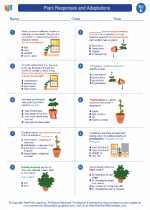 Plant Responses and Adaptations
Plant Responses and Adaptations  Worksheet/Answer key
Worksheet/Answer key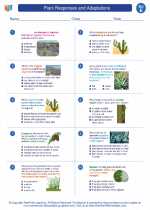 Plant Responses and Adaptations
Plant Responses and Adaptations  Worksheet/Answer key
Worksheet/Answer key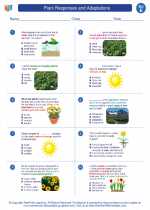 Plant Responses and Adaptations
Plant Responses and Adaptations  Vocabulary/Answer key
Vocabulary/Answer key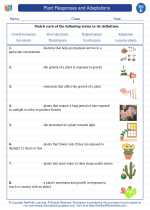 Plant Responses and Adaptations
Plant Responses and Adaptations  Vocabulary/Answer key
Vocabulary/Answer key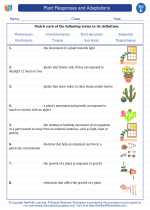 Plant Responses and Adaptations
Plant Responses and Adaptations 

 Activity Lesson
Activity Lesson
 Worksheet/Answer key
Worksheet/Answer key
 Worksheet/Answer key
Worksheet/Answer key
 Worksheet/Answer key
Worksheet/Answer key
 Vocabulary/Answer key
Vocabulary/Answer key
 Vocabulary/Answer key
Vocabulary/Answer key

The resources above cover the following skills:
Life Science
Interdependence - A. Plants and animals, including humans, interact with and depend upon each other and their environment to satisfy their basic needs. B. Both human activities and natural events can have major impacts on the environment. C. Energy flows from the sun through producers to consumers.
Compare and contrast adaptations displayed by animals and plants that enable them to survive in different environments such as life cycles variations, animal behaviors and physical characteristics.